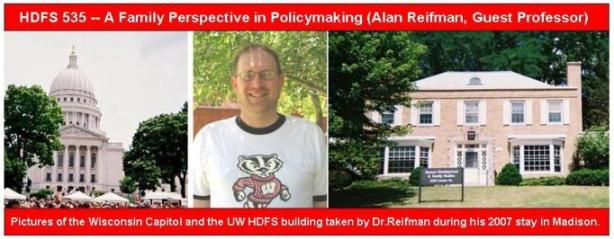UPDATE ON STUDENT PRESENTATION SCHEDULE FOR WEDNESDAY AND THURSDAY
Each student should speak for about 10 minutes, touching upon all four parts of the project (idea, supportive research, existing legislation, and family impact checklist/program evaluation). The use of PowerPoint in the presentations is optional.
As we've discussed, one of the learning experiences we're seeking from this activity involves the ability to negotiate and find common ground in a (pretend) legislative setting (thanks to Dr. Bogenschneider for this suggestion during conversations I had with her a while back).
The main way I feel we can accomplish this is by grouping proposals on similar topics to be presented back-to-back (where possible). These proposals may have some similarities, but will differ on one or more important details. We can pretend that one version has passed the House of our legislature and the other, the Senate. The class can then serve as members of the conference committee, who work to come up with a singular version of the bill to move toward final passage.
Here are the assigned presentation times, by student initials. Please e-mail me immediately if there's a problem with your assigned time (I was able to accommodate most people's preferred times).
WEDNESDAY -- FIRST HOUR
LK, MD (federal sex-education policy)
SW (childcare center accreditation)
WEDNESDAY -- AFTER THE BREAK
MC (definition of "family" for purposes of benefit packages and other areas)
EB (incorporating college education into PRWORA/TANF)
KN (parenting classes for adolescent parents)
THURSDAY -- FIRST HOUR
MNX, ML, JG (adoption, same-sex parents, second-parent)
THURSDAY -- AFTER THE BREAK
LD (same-sex marriage)
AM, GG (minimum age for marriage)
-----------------------------------------------------------------------
We left off yesterday in the middle of discussing the four features of successful government programs from the Bogenschneider book (pp. 162-164), based on the writings of Theda Skocpol (updated Tuesday evening):
1. The program's benefits are seen as a reward for service to society (e.g., GI Bill for military veterans) or at least as something that is expected to lead to future contributions to society (e.g., public schools for children). An alternative term I suggested for what underlies this line of thinking is deservingness. If a widespread perception takes hold that a program is providing rewards to undeserving recipients, that program will likely become endangered.
2. The program is universally available to a wide cross-section of citizens (e.g., Social Security, which all workers pay into and all draw benefits upon retirement). The opposite of universality, as we discussed, is means-testing. The latter says that higher-income citizens, those who already have substantial "means" to support themselves, shall be excluded from receiving the program's benefits (or receive them only in limited form). Though means-testing may promote the financial security of a program by curbing expenditures, program advocates are generally reluctant to recommend means-testing, for fear the program may come to be seen as a "welfare" program.
3. Another strength of a governmental program, according to Bogenschneider, is that it has grown out of voluntary, non-governmental organizations (NGO, such as the PTA) and remains interlinked with the voluntary association. I suggested that this might be less true today than in the past, for a couple of reasons. First, prior to FDR's New Deal programs of the 1930s, government was involved in many fewer areas than is true today, so NGO's would have been needed more to provide social services. Second, participation in traditional, organized community groups has been declining in recent decades on a per-capita basis, as documented in Robert Putnam's book Bowling Alone. An interesting discussion ensued in class, about whether today's young people lack the communitarian orientation of their elders, or still have it, but just express it differently (e.g., online chat boards).
4. The final component, for which we ran out of time, is that a program has a secure funding base.
Today, in our final day of lecture/discussion before we begin the presentations of students' legislative proposals, we will focus on Family Impact Seminars, including listening to audio clips from some actual ones.
Subscribe to:
Post Comments (Atom)


No comments:
Post a Comment